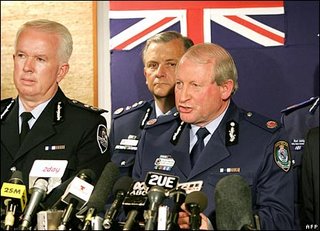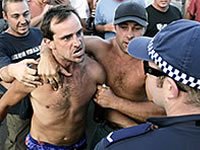 It was around 5am in the morning when my mobile phone suddenly rang.
It was around 5am in the morning when my mobile phone suddenly rang.“Hi, this is [producer] from [commercial channel]’s morning show. You must have heard about the terror raids earlier this morning. We can arrange a car to take you to Lakemba Mosque. We’d like to talk to you so we can gauge the Muslim response.”
The high profile November raids on the homes of terror suspects gave newspapers plenty to write about. A number of commentators criticised the timing and publicity surrounding the raids. At the same time, Muslim leaders in Sydney and Melbourne felt the raids proved that then-existing anti-terror laws worked sufficiently well to apprehend and protect the community from terror suspects.
Now, in a keynote speech to the Press Council on 23 March 2006, Federal Police Commissioner Mick Keelty has urged reporters and state police media units to cease filming raids on the homes of terror suspects.
Keelty said that filming the raids had caused unnecessary and justifiable angst amongst Muslim Australians. He further added that the way media reported issues related to terrorism has a “deep and abiding” impact on the recruitment of extremists and potential terrorists from within Muslim communities.
Keelty argued that police warrants should be executed without the intrusion of TV film crews whose presence potentially compromised the integrity of police work.
“The fashion of trying to provide film or footage of the execution of search warrants needs to be rethought because it is an intrusion into someone else's property. It is a precious power that needs to be, I think, surrounded by appropriate decorum.”
 In the days following the raids, Keelty made his criticism of state police media units known privately to a number of Muslim leaders in Sydney. The Press Council address is the first time Mr Keelty’s criticisms have been made publicly.
In the days following the raids, Keelty made his criticism of state police media units known privately to a number of Muslim leaders in Sydney. The Press Council address is the first time Mr Keelty’s criticisms have been made publicly.There is no doubt that Keelty’s views were reflected in the responses of many Muslims to the raids. One need only visit the forum pages of websites such as islamicsydney.com to see how many young Australian-born Muslims took a dim view of the media circus surrounding the raids.
Rightly or wrongly, many Muslims felt that coverage of the raids and the first few days of the trials reinforced community perceptions that terrorism was an inherently Muslim phenomenon.
Images of doors being smashed open, of female relatives of the accused dressed in traditional covering and of subsequent selective leaking of police fact sheets with information linking suspects to mainstream Islamic institutions did not assist in this regard.
Selective leaks by NSW police media units effectively allowed good police work to be hijacked by sectarian agendas of some tabloid columnists and radio talkback hosts.
If the greatest risk of terrorism on Australian soil arises from home-grown locally indoctrinated Muslim extremists, law enforcement agencies must have the support and confidence of local Muslims who have at least as much to lose from terrorist attacks as anyone else. At least 10% of victims of the July 7 London attacks were from Muslim backgrounds, including a young English girl whose surname was Islam.
Of course, NSW Police have been tipping off media outlets about anti-terror raids for the past 2 years. The Sydney Morning Herald reported a NSW Police public affairs officer Kylie Keough as suggesting that the practise of tipping off journalists merely highlighted the good work of police officers.
But good public relations isn’t the be-all and end-all of police work. If the price of good police PR is increased risk of Muslim resentment leading to possible recruitment of extremists, it is too high a security price for Australians of all backgrounds to pay.
Whether police spin doctors like it or not, there are media commentators and editors with clear sectarian agendas. Their ability to distort police information and evidence has led to a tide of feeling in parts of the broader community against any group deemed responsible for terrorism. A sample of the explosive results could be seen at Cronulla last December.
 Some motives mentioned by participants in the Cronulla riots (as shown on the ABC Four Corners program on 13 March 2006) illustrate the risks of allowing police information to fuel prejudice. One participant named Luke makes the following remark: “I want this government to stop the growing threat. And I want them to stop appeasing Islam. And to stop appeasing people that follow Islam.”
Some motives mentioned by participants in the Cronulla riots (as shown on the ABC Four Corners program on 13 March 2006) illustrate the risks of allowing police information to fuel prejudice. One participant named Luke makes the following remark: “I want this government to stop the growing threat. And I want them to stop appeasing Islam. And to stop appeasing people that follow Islam.”All this may seem unrelated to Mr Keelty’s warnings. Yet misinformation-fed fear of terrorism adds fuel to sectarian fires. The following dialogue sums this up.
LIZ JACKSON: What about reconciling? I mean, a lot of groups have put some effort down here into reconciliation.
LUKE: Sure, sure. But the monster's just going to go somewhere else. It'll rear its head somewhere else. There's always going to be that threat. And I think that paranoia will become part of society forever. Like, as far as I can see. And I don't - I think that's here to stay.
LIZ JACKSON: And what threat? What is the threat you're talking about?
LUKE: Terrorism, you know? It's terrorism.
When paranoia and social division reach such fevered pitch, the terrorists have already won half the battle. Yet given the tendency of even senior government ministers to reinforce existing sectarian prejudice, it is unlikely Keelty’s warnings will be heeded.
The author is a Sydney lawyer and writer.
© Irfan Yusuf 2006

